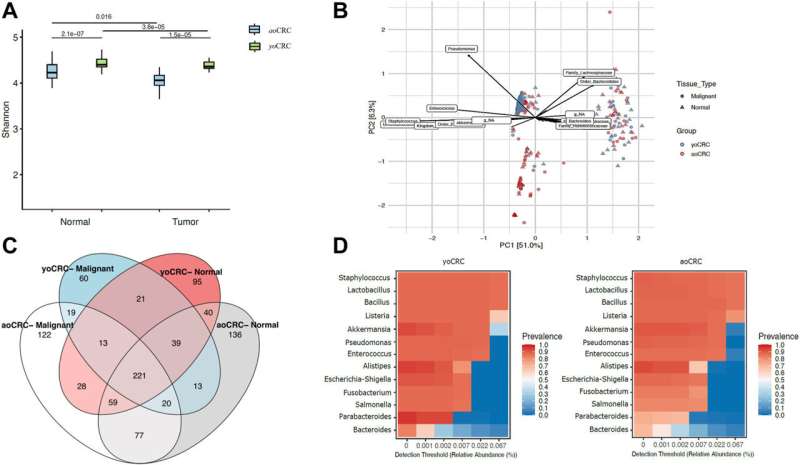This article has been reviewed according to Science X's editorial process and policies. Editors have highlighted the following attributes while ensuring the content's credibility:
fact-checked
trusted source
proofread
Research reveals unique tumor-related bacteria tied to young-onset colorectal cancer

New research has mapped changes in tumor-related bacteria to uncover potential new strategies to combat the rise of young-onset colorectal cancer (CRC) in people under the age of 50.
The research reveals differences in tumor-related bacteria associated with young-onset colorectal cancer. Published in eBioMedicine, the findings could lead to new screenings or treatments for this population.
According to the American Cancer Society, the incidence and mortality of young-onset colorectal cancer have increased by 1.5% and 1.2% per year, respectively. If this trend continues, a Journal of the National Cancer Institute report estimates the incidence of colon cancer would double and rectal cancer would quadruple in this age group by 2030.
"The unexplained rise of young-onset colorectal cancer is of great concern," said Alok Khorana, M.D., Cleveland Clinic oncologist and primary investigator of the study. "Our team discovered that bacteria were more abundant and compositionally distinct in tumors from young-onset patients. These insights help us to better understand the disease causes and inform new prevention approaches, diagnostic markers, and therapeutic targets."
This retrospective study used gene sequencing technology to compare tissue samples from 136 young-onset colorectal cancer patients with 140 average-age patients with the disease. They identified unique tumor-related bacteria in the younger cohort and found that they were more likely to have left-sided, rectal and advanced stage tumors. Key microbes associated with young-onset cancers included Akkermansia and Bacteroides.
First authors of the paper were Shimoli Barot, M.D., of Cleveland Clinic Cancer Institute, and Naseer Sangwan, Ph.D., of Cleveland Clinic Lerner Research Institute. Dr. Khorana also holds the Sondra and Stephen Hardis Chair for Oncology Research.
"By detailing this microbial signature of young-onset disease, we can look toward new screening biomarkers and drugs targeting related bacteria," said Dr. Barot.
Dr. Sangwan added that "further research is needed into how lifestyle factors such as diet, medications and obesity may impact gut bacteria and contribute to young-onset colon cancers."
More information: Shimoli V. Barot et al, Distinct intratumoral microbiome of young-onset and average-onset colorectal cancer, eBioMedicine (2024). DOI: 10.1016/j.ebiom.2024.104980
















